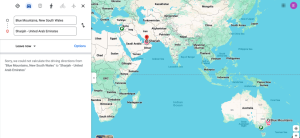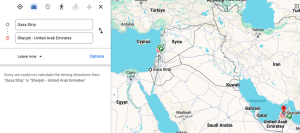a few reflections
Eddie Abd
Published August 2024

The distance between Dharug and Gundungurra Country and Sharjah cannot be calculated.
Early 2023, I accompanied Jagath Dheerasekara, Jody Haines, Eugenia Lim, Samira Farah, Gillian Kayrooz, Akil Ahamat, Tarik Ahlip and Roberta Joy Rich to the UAE. It was a journey spearheaded by colleague Nithya Nagarajan, back then Arts House’s co-artistic director, with support from the Utp and Arts House teams.
Sharjah Biennial 15 has generated so much thoughts, after thoughts, reactions and realisations for myself and our group. For ten days we undertook an exhilarating / exhausting marathon of art savouring with a toe dip into parts of Emirati society.
Experiencing the works of so many artists from across the globe was a privilege.
The biennial was astounding in its breadth. Expansive, spread across multiple sites, thoughtfully and beautifully pulled together with emphasis on representation of artists from the ‘global south’.
An invitation to consider colonial legacies / ongoing permeation guided by curator Okwui Enwezor’s provocation “thinking historically in the present”.
It felt generous to the artists, the art, its principal audience; I think of the speakers (the deep thinkers, the academics), the visitors, the people who seemed to travel from one biennale bubble to the next, the insiders.
It felt neutral, at times indifferent or alien, to its peripheral audience; the people standing in front of/minding the galleries, driving the taxis to and from sites, working at the eateries, the kids playing football in the shade of the tall Sharjah Art Museum building.
And ‘us’ stepping in and out of these intersecting spaces.
Where art has a role, or at least an intention, to illuminate the spectrum of the human condition, a dose of cynicism is natural and healthy to be present, especially when this art inhabits opulent spaces that are far removed from its communities of inception. In the same breath, I can say that I did feel ‘illuminated’ by works I experienced. Bouchra Khalili’s The Circle , Nusra Latif Kureshi’s Mild Red Steel and Hajra Waheed’s Hum II quickly come to mind. I visited extraordinary sites outside of Sharjah City that housed brilliant works; a resurrected medical clinic ( Ibrahim Mahama’s Sunshine Day, Hoda Afshar’s Remain , Felix Shumba’s Nocturnal Body ) and what feels like an abandoned kindergarten where I felt the distant children’s screams and whispers permeating through the space (Heri Dono’s Fermentation of the Brain, Gabriela Golder’s Conversation Piece).
It’s easy for me to slip into moralistic positions when affronted by glaring tensions in arts spaces scaffolded by systems of power while simultaneously platforming screaming art that commands us to rethink everything we know, including our own positions, our own complicity with these systems.
It is what it is, if you choose to engage with it you are complicit, as in “folded together”, as Gayatri Spivak says in her keynote March Meeting 2022 talk (at 5 min 40 sec).
The question for me is then what do I take from this experience. How do I self check, not giving in to the complicities I am folded with in the variety of spaces I occupy. At the forefront for me, an ongoing reckoning, the life I am making with my family as a migrant from Lebanon, living and making art on stolen land. I live, travel and work mostly on the lands of Dharug and Gundungurra peoples. I pay my respects to the elders , the custodians of these countries, past, present and future.

The distance between Sharjah and Gaza cannot be calculated.
Biographies
Eddie Abd is a visual artist and creative producer, working for the past 10 years on creative multimedia projects across Western Sydney. Her approach to working with people is shaped by her own experiences and learnings as a migrant, carer, artist and broadcast journalist.
She is the recipient of the 2021 Blake Emerging Artist Award and the 2022 NSW Visual Arts Fellowship (Emerging).
She has held solo shows at Firstdraft, Blue Mountains Cultural Centre and Casula Powerhouse Arts Centre. Eddie studied Painting at the National Institute of Fine Arts (Lebanon) and has completed a Bachelor of Digital Media at COFA (UNSW). Eddie lives with her family on the unceded lands of the Dharug and Gundungurra peoples and pays her respect to Elders past, present and emerging.